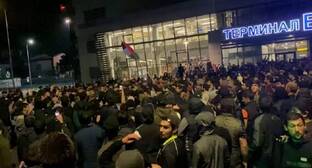04 July 2019, 10:49
Analysts treat mass detentions after attacks in Chechnya as lawlessness
The practice of mass detentions of acquaintances of a suspected militant is not unique for Chechnya and Northern Caucasus; this is a common method of Russian law enforcers, said Ruslan Kutaev, the head of the Assembly of Caucasian Nations.
It was reported that several people were detained because of their acquaintance with Akhmed Barzaev, who was killed in the attack on policemen. On July 2, the Chechen Ministry of Internal Affairs (MIA) has reported that all the detainees were released after interrogation.
"No doubts that such detentions violate human rights, but this is practiced not only in Chechnya, but throughout Russia," said Kutaev, adding that such detentions are often accompanied by the use of force and personal humiliation.
The practice of illegal detentions and torture, characteristic of Northern Caucasus, has spread throughout Russia, said Alexander Cherkasov, a member of the board of the Human Rights Centre (HRC) "Memorial".
Attacks on law enforcers in Chechnya most often lead to detentions of attackers' acquaintances. Thus, after the attack on policemen in August 2018, residents of Chechnya reported several waves of detentions of young people.
Russian law enforcers are conducting detentions with elements of a "theatrical performance", by exerting psychological pressure on people, Gennady Gudkov, a retired FSB colonel, has noted.
He believes that the practice of renouncing a relative suspected of a crime against the state dates back to the times of Stalinist repression.
This article was originally published on the Russian page of 24/7 Internet agency ‘Caucasian Knot’ on July 3, 2019 at 11:12 pm MSK. To access the full text of the article, click here.
Author: Rustam Djalilov Source: CK correspondent




